Can your cat make a lot of different noises? Many cats have a range of vocal sounds that they use to express various needs and meanings. Here are a few typical sounds and the interpretations they often express.
Your cat must be purring when he sees you because he is expressing his sense of delight through purring.
A cat’s purr is a throaty, vivid sound. The tone and volume of the sound vary from cat to cat. Some cats purr so intensely that their entire bodies vibrate, and you can hear them from across the room.
The purr of other cats is very silent. To different cats, the purr will mean different things.
The purr’s most famous sense is that a cat is relaxed and comfortable. It’s most popular when cats are fed, beginning to feed, being petted, and adored.
Key Takeaways
- Cats typically purr when they are happy and content, but may also purr when they are sick or scared.
- The exact mechanism of purring is not known, but it is thought to be controlled by a neuronal oscillator in the cat’s head.
- Cats may purr when they see their owner because they are happy to see them, have missed them, or because they expect to be fed or watered.
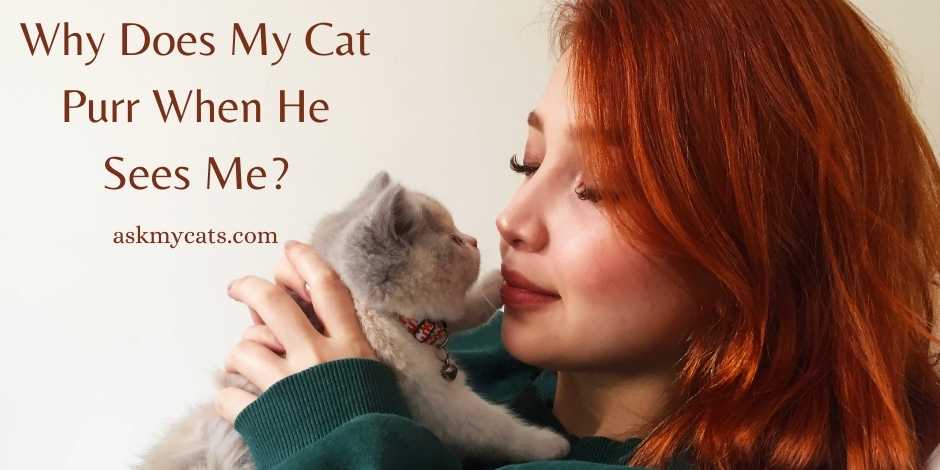

Give Your Cat the Perfect Day
Get the Free Ebook!
Why Do Cats Purr Around Their Owner?
Some cats, on the other hand, purr while they are sick or afraid and want to express their concern to you through purring.
In any case, some cats purr.
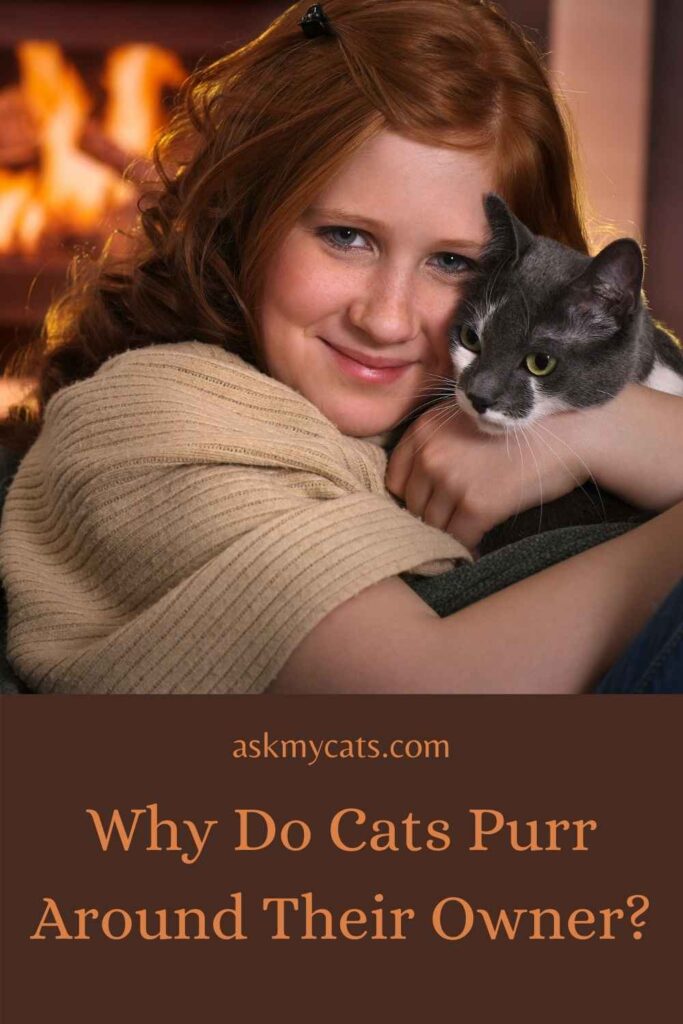
For example, I have a cat that purrs when he is happy and content, as well as when he is afraid, such as when he is getting blood drawn. The purr is frequently unique.
When he’s happy, he moves at a slower, more comfortable pace; when he’s afraid, he moves at a quicker, more frantic pace.
Some behaviorists claim that the purr is soothing to the animal and is used for “self-comfort” in cases such as when they are afraid.
Nothing beats the warm fuzzy feeling you get when you come home after a long, tiring day at work and are welcomed by your little fluffy baby’s comforting, never-ending purr.
This cat’s spontaneous vibratory phenomenon has been presenting more and more data to support the argument that owning a pet is naturally therapeutic.
“Cats purr as a way of communicating with their owners, expressing emotions such as happiness, contentment, and affection. If your cat is purring when they see you, it is likely a sign that they are happy to see you and want to be close to you.”
Dr. Elizabeth Colleran, DVM, President of the International Society of Feline Medicine
If you’re an animal lover, you’ll get what I’m talking about. In any way, the love you get from an animal is unconditional.
No one knows for certain why cats purr. There are some educated guesses, conclusions, and written explanations.
Fact that science is now reasonably certain that this is the mechanism, there is no conclusive answer as to what causes the reaction. The most important hint is a neuronal oscillator deep inside the cat’s head, which has no obvious function.
Should You Be Concerned If Your Cat Starts Purring Around You?
You should not be concerned at all if your cat starts purring after seeing you because this sign is just a token of love from your beloved pet. Do not ignore their thoughts and expressions!
Purring cats purr for a variety of occasions.
Did you know that holding your cat as it purrs will make you relax and lower your blood pressure? Take pleasure in the purr.
Cats purr for a variety of reasons, including relaxing themselves when they are ill. When a cat sees you and begins to purr, it means they are happy to see you and have missed you. When their parents get home, the majority of the cats start meowing as well.
Cats enjoy you and feel comfortable when they lie beside you, on/near you, and start purring. Your cat is delighted to see you and greets you when you get home.
My cat used to come running to me when I called him and meow so loudly that he would immediately sit down with me and sleep.
“While cats may purr when they are happy and content, they may also purr when they are feeling anxious, stressed, or in pain.
If your cat is purring when they see you and you are not sure why, it is important to check for any signs of distress or discomfort, and seek professional help if necessary.”
Dr. Karen Sueda, DVM, Diplomate of the American Board of Veterinary Practitioners
“Cats may also purr when they are hungry or thirsty, or when they want to play.
If your cat is purring when they see you and you have not recently fed or watered them, or engaged in interactive playtime, consider providing some food and water, or engaging in some playtime to see if this satisfies their needs.”
Dr. Rachel Barrack, DVM, Founder and Chief Medical Officer of Animal Acupuncture in New York City
Interesting Read: Why Does My Cat Lay On Me And Purr?
Does Purring Of A Cat Indicate That They Are Dying?
No, the purring of a cat does not indicate that the cat is in a serious health condition or he is dying immediately.
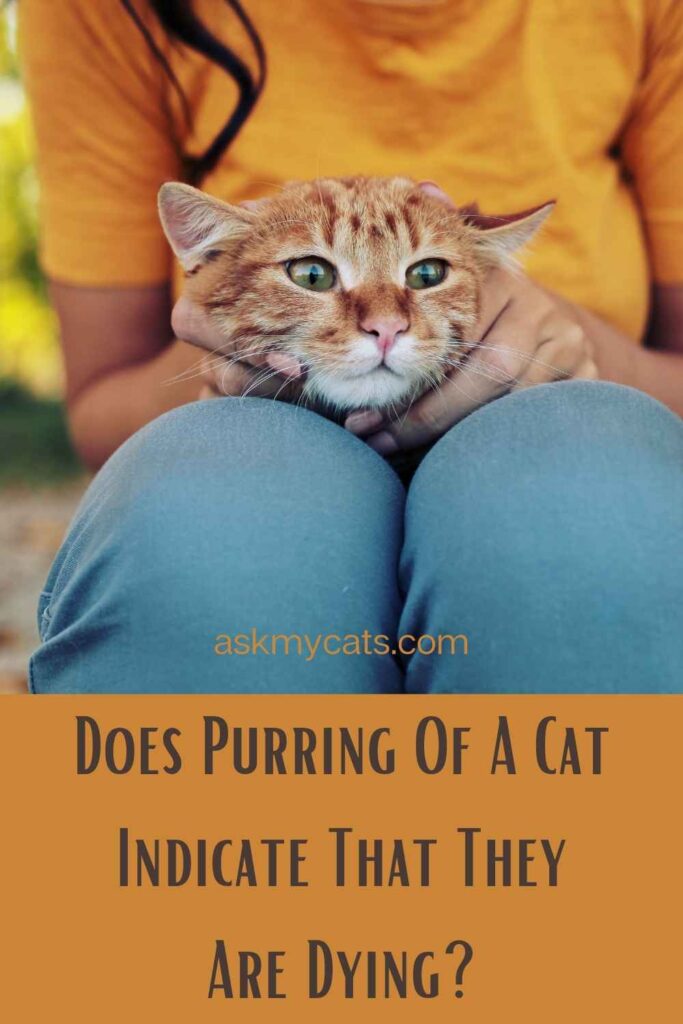
If your kitten is well, it can purr because it is content and loves what you are doing with it. Since it is warm and comfortable, a happy cat lying in the sun will purr.
A mother cat may be purring while feeding her kittens purrs because she is happy, and a purr is reassuring to her kittens also.
A mother cat purrs a lot while she’s giving birth. And though giving birth is difficult, the cat can purr often.
My cats’ purrs were the strongest as they climbed into bed with me and surrounded me purring. They did that every night, and it made me feel great.
Although it is common for a dying cat to purr when its owner is caring for it (for example, when a cat has kidney disease and isn’t eating properly), this does not mean that purring is a symptom of a crisis. When they get weaker, they will purr as the other cats in the house snuggle up to them.
It simply means that a sick or dying cat will purr. Purring isn’t an indication that something is “ok” or that the cat isn’t in distress.
The sick cat may seek care, comfort, love, and cuddling from the other cats in the home, or it may provide and receive comfort from its humans.
Purring does not necessarily indicate that the cat is well and content. Your cat’s temperament and energy levels, as well as how it responds when picked up, whether it will hop to places it used to be able to, whether it withdraws from playing, withdraws from other pets it used to enjoy cuddling with, and if it hides a lot while it used to be outgoing. These attitude shifts are a sign that it’s time for a vet visit.
Don’t say a cat isn’t in distress either because it purrs. If you’re not positive, a vet exam is the only way to be certain.
Must Read: Cat Purring Effect On Humans: The Power of Cat Purring
Is Your Cat Purring Constantly?
Since cats purr at a pace and volume too low to go far, it’s a means of communication intended for those close to them.
Purring (and a variety of other low-frequency vocalizations in mammals) is often associated with positive social conditions, such as feeding, grooming, calming, and being polite.
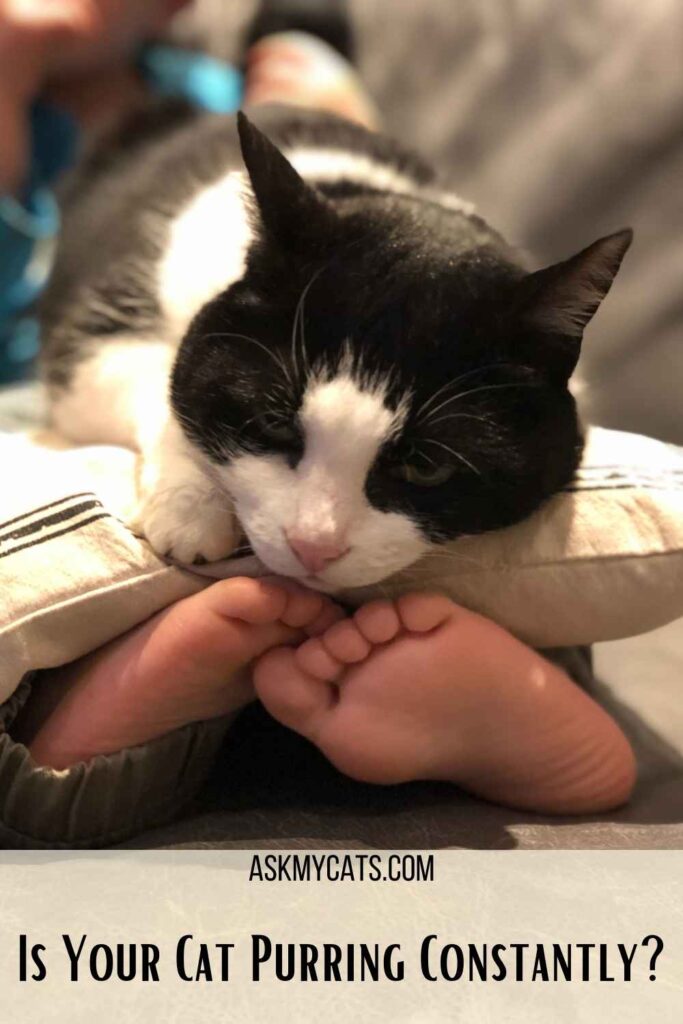
Purring is more likely to be calming or self-soothing since cats can purr in stressful situations.
Purring will then be similar to how people relieve stress by screaming, smiling, amusing themselves, or even arranging their desks.
Though research literature on the subject is scarce, some veterinarians and cat lovers have observed cats lying opposite each other and purring when one is wounded.
“Purr treatment” may have bone-healing effects in addition to being soothing for the wounded kitty. Domestic cats purr at about 26 Hertz, which is in the range that facilitates tissue regeneration.
That isn’t as strange as it sounds: high-impact activity improves bone protection for the same reason: bones respond to pressure by strengthening themselves.
Cats spend a lot of time lying around waiting to hunt in their natural environment, so purring can help to stimulate bones and keep them from being fragile or brittle.
No one knows for sure why cats purr, but there are a few strong theories. The simple observation is that cats purr when they are happy and content.
However, this isn’t necessarily the case: certain cats purr when they’re starving, hurt, or scared. Surprisingly, purring frequencies have been found to promote bone regeneration—right, that’s bone regeneration.
Cats purr by contracting their larynx and diaphragm muscles during inhalation and exhalation, though the exact mechanism by which the central nervous system induces and regulates those contractions remains unknown.
Interesting Read: Why Does My Cat Drool When He Purrs?
Why Does My Cat Purr When He Sees Me?
When cats are happy, comfortable, and satisfied, they purr.
You could hear a soft rumble as they breathe in and out while yours is curled up in the light. When you touch them, you can sense a slight tremor. It’s as if they’re throwing out rays of tranquility.
However, you cannot believe that this sound indicates that your cat is in a happy mood. Or that it will be the last time you hear it. Cats purr to express a variety of desires and wants.
The most frequent sound made by cats is purring. Still, apart from meowing, chirping, chattering, hissing, and growling, we know so little about it.
While you’ll never know precisely what your cat is doing as they purr, you might make an educated guess based on research by animal experts and the circumstances.
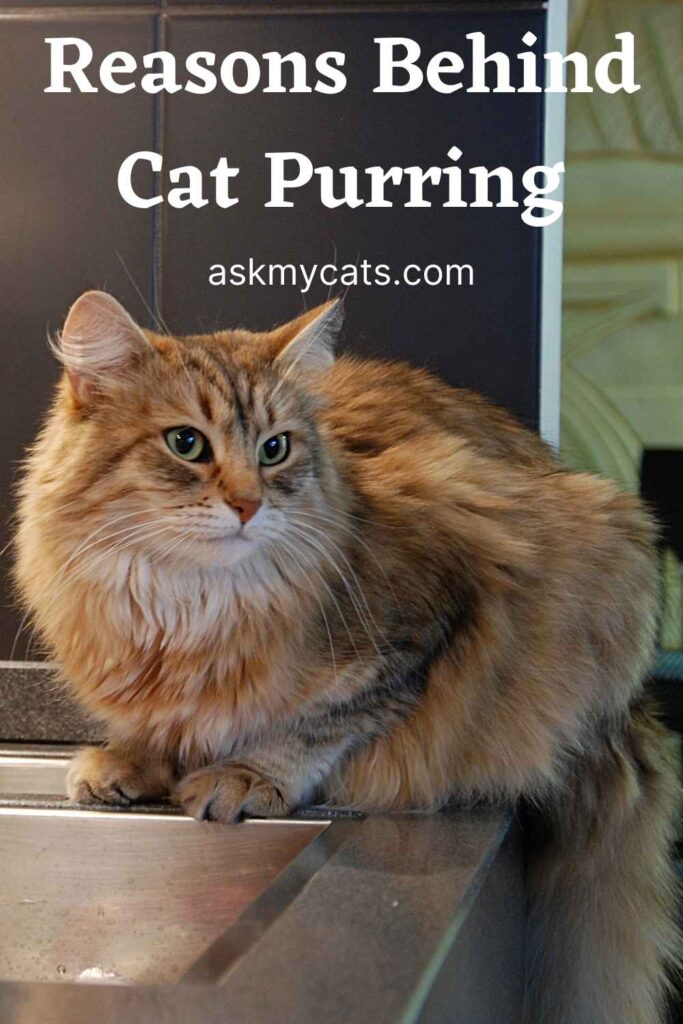
1. Happy Kitty
Your cat seems to be at ease, lying on its back with half-closed eyes and a mostly still tail.
It’s fair to say they’re in their happiest spot if they’re purring. A broad grin is making the noise.
2. Hunger Strike!
When it’s time to eat, some cats purr. House cats emit different sounds when they’re starving and when they’re not thinking about food, according to British researchers. The purrs aren’t the same now.
When cats purr for food, they pair their regular purr with an unpleasant scream or mew, similar to that of a human infant.
This tone, according to experts, is more likely to elicit a response from us. And if they don’t own a cat, they’ve discovered that people can tell the difference between purrs.
Interesting Read: Why Do Cats Purr While Eating?
3. Mother-Kitten Relationship
And kittens as young as a few days old will purr. It’s most likely a means of informing their mothers of their whereabouts or that they’re safe.
Purring also aids in the bonding of a kitten with its mother. It’s used as a lullaby by mama cats.
4. Relief And Recovery
It may actually be a cat’s way of soothing itself, similar to how an infant sucks their thumb to feel better.
However, some evidence indicates that purring can help cats recover more quickly.
Purrs have a low frequency that induces a sequence of movements in their body that can:
- Bones and bruises should be healed.
- Strengthen your muscles while also repairing your tendons.
- Breathe easily.
- Reduce the amount of discomfort and swelling in the body.
This may understand why cats are able to avoid falling from great heights and have fewer surgical complications than dogs.
Interesting Read: Why Does My Cat Purr And Bite Me?
| Reason | Explanation |
|---|---|
| They are happy to see you | Cats may purr when they see their owners as a way of expressing happiness and affection. This is especially true if the owner is someone that the cat has a strong bond with. |
| They are seeking attention | Cats may purr when they see their owners as a way of seeking attention or affection. Cats can be very affectionate animals, and they may purr when they want to be petted or cuddled. |
| They are feeling anxious or stressed | Cats may purr when they see their owners as a way of self-soothing and calming down if they are feeling anxious or stressed. This is especially true if the cat has experienced separation anxiety when the owner is away. |
| They are in pain | Cats may purr when they see their owners as a way of seeking comfort or relief if they are in pain. This is especially true if the cat is injured or ill and needs extra care and attention. |
Why Does My Cat Purr And Then Bite?
Some cat owners refer to this as a “love bite,” although others refer to it as “petting violence.”
It’s a contentious subject, but it’s assumed that if your cat bites you for no particular reason, it’s because they’re being overstimulated by the excessive stroking – which you thought they liked!
Another hypothesis is that repeated stroking causes static electricity to build up on your cat’s coat, creating small shocks that cause them to respond negatively.
Alternatively, your pet can have a sore joint that you unintentionally stroke while stroking it; this is more likely if your cat is elderly.
Petting-induced provocation or defensive chewing, for whatever reason, may be avoided by encouraging early socialization.
The amount of petting a cat tolerates is determined by their interactions with humans as a child, so spending time with your kitty while they’re young is crucial!
Any cat (of any age) that feels threatened and has attempted other methods of defense that haven’t succeeded (such as moving away) can retaliate with violence, which could include biting.
It’s important to let your cat call the shots and let them go if you’re sitting calmly with them on your lap and they’ve had enough petting for the day.
Younger cats can bite as a result of being scared or unsure of something new in their lives. When a mother cat is defending her children, she may become violent, or if they are in distress, they may lash out and bite.
Biting that is more playful and non-aggressive is also a regular part of kitten play! This is a natural action, so keep your hands out of the way while playing with kittens!
Interesting Read: Do Feral Cats Purr?
How To Respond When Your Cat Purrs When They See You
| Response | Explanation |
|---|---|
| Pet or cuddle your cat | If your cat is purring when they see you, it may be a sign that they want to be petted or cuddled. Take a moment to give your cat some love and affection, and see if their purring continues or intensifies. |
| Check for any signs of distress or discomfort | While cats may purr when they are happy and content, they may also purr when they are feeling anxious, stressed, or in pain. If your cat is purring when they see you and you are not sure why, take a moment to check for any signs of distress or discomfort, such as panting, meowing, or scratching. If you suspect that your cat is in pain or discomfort, consider taking them to the vet for a check-up. |
| Provide food and water | Cats may purr when they see their owners as a way of signaling that they are hungry or thirsty. If your cat is purring when they see you and you have not recently fed or watered them, consider providing some food and water to see if this satisfies their needs. |
| Play with your cat | Cats may purr when they see their owners as a way of signaling that they want to play. If your cat is purring when they see you and you have not recently played with them, consider engaging in some interactive playtime to see if this satisfies their needs. |
| Seek professional help if necessary | If you are not sure why your cat is purring when they see you, or if you are concerned about your cat’s behavior, consider seeking professional help from a veterinarian or a cat behaviorist. They will be able to assess your cat’s overall health and well-being and provide guidance on how to address any concerns you may have. |
Some of the Interesting reads regarding cat purring:
- Why Do Cats Purr? The Science of Cat Purring
- Why Doesn’t My Cat Purr?
- How To Make A Cat Purr?
- Why Do Cats Purr When They Are Dying?
- Do Cats Purr When They Sleep?
- Why Does My Cat Purr When He Sees Me?
- Why Does My Cat Purr So Loudly?
- Why Is My Cat Purring So Much?
- Why Do Cats Purr When You Stroke Them?
- Can Cats Control Their Purring?
- Do Cats Purr When They Are Happy?
- Why Does My Cat’s Purring Sound Congested?
- Do Cats Breathe Faster When Purring?
- Differences In Purring Between Cat Breeds
- Why Do Cats Wag Their Tails While Purring?
- How To Purr Like A Cat?
- Why Do Cats Purr When You Talk To Them?
- Why Do Cat’s Noses Get Wet When They Purr?
- Why Is My Pregnant Cat Purring So Much?
- Why Do Cats Purr And Knead?
- Do Cats Purr When They Are Sick Or In Pain?
Frequently Asked Questions
What does it mean when a cat purrs when they see you?
Purring is the most evident and natural way for cats to express their joy and affection. When you’re petting your cat, you’ll always hear a rumbling, vibrating noise. Purrs may also indicate that your cat is irritated, but this is less normal.
Is purring a sign of contentment in cats?
While cats purr to express contentment, they may also purr to express nervousness, anxiety, or tension. Fortunately, it’s most likely a sign of the former. For decades, people have speculated that purring was a means of communication.
Why does my cat trill when he sees me?
Adult cats also use trilling to show love and pleasure. You may notice that your cat trills to show that they want to be petted. Trilling can be a way for your pet to get your attention as well as a show of love.
Final Words
Purring is the purest expression of feline contentment and affection. Your cat is expressing her affection for you by meowing, which is a sound meant only for a cat’s unique person.
Cats like to be close to their owners and to be the center of their attention. Both of my cats like to chase me around the house while I do chores, occasionally tripping me along the way to make sure I pay attention to them.
I’m not supposed to go into the bathroom alone, and I’m not allowed to lock the bathroom door because I want them to slam it shut!
Let us know in the comments section below your experiences regarding this!
